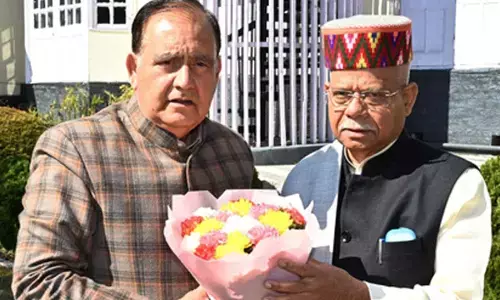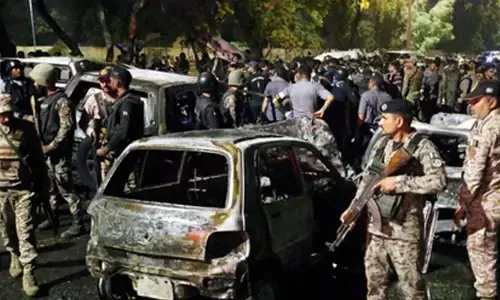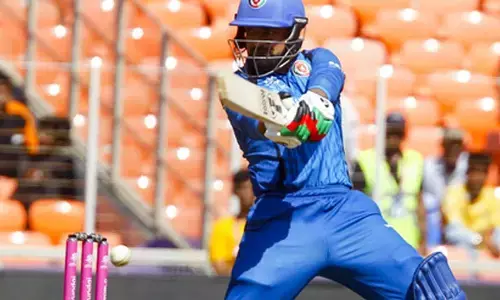I watch a film every Friday: Rakesh Roshan
In a rare appearance Roshan Trio that is filmmaker Rakesh Roshan, music director Rajesh Roshan and Hrithik Roshan came together for a session at Confederation of Indian Industries (CII).
In a rare appearance Roshan Trio that is filmmaker Rakesh Roshan, music director Rajesh Roshan and Hrithik Roshan came together for a session at Confederation of Indian Industries (CII). There was excitement in the hall at Hotel Taj Palace, New Delhi to watch the family share the dais together and discuss movies.

In a rare nostalgic mood Rakesh Roshan traced his journey to stardom. Over to Roshan:
“The fact is no matter how big a film we make, it’s the people who decide the fate of the film. The test, therefore, is in making a different film every time and this is possible only by constantly reinventing. I always made a conscious effort to do this. My directorial debut ‘Khudgarz’ was about friends, ‘Khoon Bhari Maang’ starring Rekha about revenge, ‘Karan Arjun’ about reincarnation, ‘Kaho Naa Pyaar Hai ‘about love, ‘Koi Mil Gaya’ about an autistic hero, ‘Krrish’, about a superhero and, ‘Krrish 3’ about breaking records.
I believe that there is no celebration without taking risks; probably, my brother Rajesh and I have inherited this streak from our parents. My late father, composer Roshanlal Nagrath (referred as Roshan by everybody), initially worked with AIR, Delhi where my mother, Ira Moitra, was a singer. After marriage, they moved to Mumbai looking for greener pastures.
My father, heralded from Barielly (in Uttar Pradesh) while my mother, a Bengali, was from Delhi. When they came to Mumbai in search of work, they stayed in for a while in a garage that belonged to noted music director duo Husnlal-Bhagatram. I was born in 1949 in a stable, next to the garage where we stayed in Versova.
My father got his first break with director Kidar Sharma's ‘Neki Aur Badi’. The film failed at the box- office and father decided to move back to Delhi. The day we were leaving, Kidar Sharma told my father that he was starting another film, ‘Bawre Nain’, and wanted my father to give the music and maybe he should postpone his decision; father agreed and stayed back. Kidar Sharma’s ‘Bawre Nain’ starred Raj Kapoor and Geeta Bali and the film became a turning point in my father’s career. Kidarsaab wrote the lyrics of ‘Khayalon mein kisike…' and 'Tere duniya mein dil lagta nahin…’. And the two became a team. We were happy and life was rosy, till November 66, when my father suddenly passed away. He was just 49 at that time and I was still in school. My mother shifted me to a boarding in Satara after which I joined Nowrosjee Wadia College in Pune.
I was thinking of joining FTII (Film and Television Institute of India) to study filmmaking but my mother was alone in Mumbai and I had a younger brother to take care, so I decided to stay with the family and work as assistant. I assisted HS Rawail during ‘Sunghursh’ in 1968, starring Dilip Kumar, Vyjayanthimala and Sanjeev Kumar. After ‘Sungarsh’, I joined Mohan Kumar and assisted him during ‘Anjaana’ (1969) and ‘Aap Aye Bahaar Ayee’ (1971). Both had Rajender Kumar in the lead. Along with assisting I also worked as production assistant and earned Rs 200 a month out of which I gave100 to my mother and used the remaining for my travel and food. My father had left enough money for us but my mother was of the opinion that I must work hard for my living and I did.
One day, on the sets, Rajender Kumar asked me what I wanted to do in future and I said I want to become an actor. On Rajendra Kumar’s recommendation I got two films – ‘Man Mandir’ (1971) and second, Nagi Reddy's ‘Ghar Ghar Ki Kaahani’ (1971). I was getting good films, was appreciated as an actor through films like ‘Khel Khel Mein’ (1975), ‘Khatta Meetha’ and ‘Khoobsurat’ but was never recognised as a full-fledged hero. It hurt but I never gave up. I accepted whatever roles came my way, be it parallel roles or villain roles. I had made up my mind that if I cannot be a lead star I will become a leading filmmaker. I will launch my own banner the way Raj Kapor and Guru Dutt ji did. I struggled to launch Film Kraft; however, I produced four films ‘Aap Ke Deewane,’ ‘Kaam Chor’, ‘Jaag Utha Insaan’ and ‘Bhagwan Dada’. During this period, I learned so much that I was slowly and gradually getting ready to become a director!
I debuted with ‘Khudgarz’ and in coming years tasted both success (Kishen Kanhai) and failure (King Uncle). I made ‘Karan Arjun’ with Salman and Shah Rukh, and joined forces with my son Hrithik for ‘Kaho Na Pyaar Hai’ and ‘Krrish’ trilogy. I believe in quality rather than quantity and that is why in my long career I have directed only 15 films. Whenever I complete a film, I tell myself no more, ab isske baad films nahin banaoonga...I take a break... till the thirst awakens again and I’m back to the sets.
The most difficult part about filmmaking is the story. Like all directors, I have many stories playing in my head but unless I’m absolutely sure that all the dots connect each other I don’t start and don't stress over it too much.
Hindi cinema has changed, became global and the internet has a big contribution in the world becoming a small place. I watch a film every Friday in a cinema hall and from every film I watch, I learn something new every day.”










